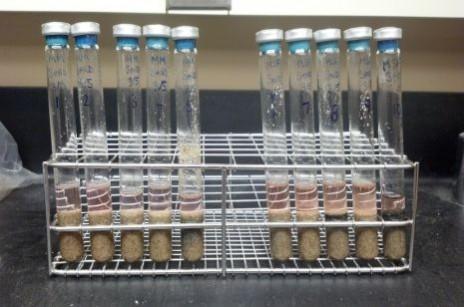
A latest study has found that Methane-producing microbes, or Methanogens, surviving on Earth can also survive in the thin air of the Martian atmosphere.
Also Read: Mysterious pillars of light spotted in Canada's night sky [VIDEO]
The Martian surface is known to be extremely cold and dry, but evidence has pointed towards the presence, at some point, of water bodies on the Red Planet, billions of years ago.
Scientists believe that life must have evolved with the presence of water on Mars and there is scope that life exists there even now.
The study was led by Rebecca Mickol, an astrobiologist at the Arkansas Center for Space and Planetary Sciences at the University of Arkansas in Fayetteville, along with Timothy Kral, a professor of biological sciences in the Arkansas Center for Space and Planetary.
Kral has been analyzing methanogens and their ability to survive in a Martian environment since the 1990s.
The question regarding the role methane plays in the Martian atmosphere gained a lot of traction after methane was detected there in 2004.
"The surface temperature on Mars varies widely, often ranging between minus 90 degrees Celsius and 27 degrees Celsius over one Martian day," Mickol said in a statement.
"If any life were to exist on Mars right now, it would at least have to survive that temperature range. The survival of these two methanogen species exposed to long-term freeze/thaw cycles suggests methanogens could potentially inhabit the subsurface of Mars."
Methanogens are considered among the most ancient and simplest of organisms present on Earth. They are anaerobic and hence these microbes are non-photosynthetic, which indicates that they could survive in sub-surface environments as well. This makes methanogens a potential candidate for life on Mars, the study speculates.
They utilise hydrogen as their source of energy and carbon dioxide, in order to generate methane. The methane-generating microbes can be found in the gut of cattle and termites, and in marshes and swamps, as well as dead and decaying matter.

In this research, two species of methanogen — Methanothermobacter wolfei (M. wolfeii) and Methanobacterium formicicum (M. formicicum) — were subjected to Martian conditions. It was observed that both species survived the Martian freeze-thaw cycles they were subjected to in the experiments conducted by Mickol.
Although, the temperature of the Martian freeze-thaw cycles was found to be lower than the ideal growth temperatures for these microbes, which was found to be 55 degrees Celsius (131 degrees Fahrenheit) for M. wolfeii, and 37 degrees Celsius (98.6 degrees Fahrenheit) for M. formicicum.
One of the major issues the researchers faces was creating a low-pressure, oxygen-free environment. Another issue was that water evaporates fast at low pressures and this could have adversely impacted the experiment.
These microbes were exposed to pressures as low as six-thousandths of Earth's surface pressure, over a span of 3 to 21 days.
"These experiments show that for some species, low pressure may not really have any effect on the survival of the organism," Mickol said, as per a statement.
Next, these microbes were exposed to Martian temperatures which are extremely low, around -100ºC (-212ºF) at night and which can rise above freezing on the warmest day of the year at noon. The researchers carried out the experiments at temperatures above freezing.
"The low temperature on Mars inhibited their growth, but they survived. Once they got back to a warm temperature, they were able to grow and metabolize again," Mickol added.
This research is published in the journal Origins of Life and Evolution of Biospheres and was supported by the Exobiology & Evolutionary Biology element of the NASA Astrobiology Program.
"These experiments do not prove life exists on other planets. That being said, with the abundance of life on Earth, in all the different extremes of environments found here, it's quite possible there exists life — bacteria or tiny microorganisms — somewhere else in the universe," Mickol stated.
"We're just trying to explore that idea, she said," she concluded.















